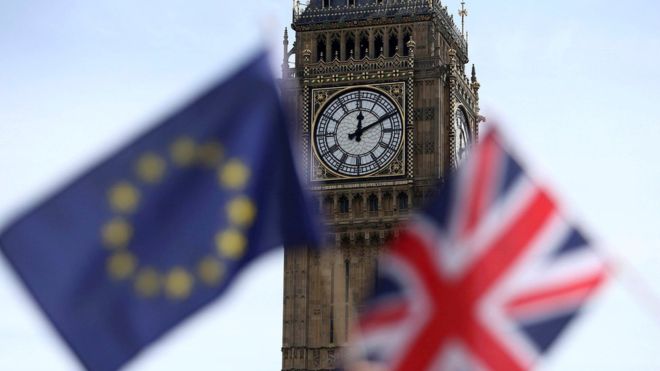MPs are to begin two days of debate over the government's parliamentary bill to get the formal process of Brexit under way.
Discussions on the European Union Bill have been extended to midnight on Tuesday to accommodate more speakers, with a vote to take place on Wednesday.
Labour leader Jeremy Corbyn has ordered his MPs to vote with the government, but some are expected to defy him.
Ministers want to get the bill passed in time to trigger Brexit by 31 March.
The European Union (Notification of Withdrawal) Bill would allow Prime Minister Theresa May to invoke Article 50 of the Lisbon Treaty, getting official talks between the UK and the EU started.
The Liberal Democrats and Scottish National Party are to vote against it, but Labour's leadership is backing it, meaning the government is expected to win.
The size of the Labour rebellion will be closely scrutinised, with several of his MPs indicating they plan to defy Mr Corbyn.
Two shadow ministers have quit, saying they want to vote against it.
Former Conservative Chancellor Ken Clarke has also said he will vote against the bill.
Former Labour leadership candidate Owen Smith told BBC Radio 4's Today programme he would defy party orders and vote against triggering Article 50, saying people were being "lied to" about how difficult the Brexit process was going to be.
But former Conservative minister and Remain campaigner Nicky Morgan said she was not planning to vote for any of the amendments.
"Regardless of how people voted or campaigned last year, there was a fair and democratic vote in June 2016. And whatever we think, more people voted to leave and I think it is right that the government should honour that, that the Article 50 process should be triggered - and that MPs like me should respect and accept that result and support the Bill," she added.
If the vote goes the government's way, the bill will return to the Commons next week for the committee stage when opposition parties will try to push through a series of amendments.
Speaking in Dublin on Monday, Mrs May said MPs would face a very clear choice when they came to vote on the bill.
"The people of the United Kingdom voted on 23 June last year. They voted in a referendum that was given to them overwhelmingly by Parliament," she said.
"The people spoke in that vote. The majority voted to leave the European Union. I think it is now the job of the government to put that into practice. I hope that when people come to look at the Article 50 Bill they will recognise it is a very simple decision: do they support the will of the British people or not?"
The bill was published last week, after the Supreme Court decided Parliament must have a say.
Guy Verhofstadt, the EU parliament's Brexit negotiator, told the BBC's Newsnight programme Mrs May would not be allowed to "pick and choose" those benefits of EU membership she might want the UK to retain.
"We need a fair partnership," he said. "You cannot create a status for countries outside the European Union where it is even more favourable than for the countries that are members. No taxpayer in Europe will accept such an outcome."
But he said Europe needed to be "generous" not just to the UK as a country, but, in his opinion, to those UK citizens who wanted to remain in Europe.
"Maybe some advantages of the European Union could be kept for those people in the UK who want to have them in the future and that is a generous offer, I think."

